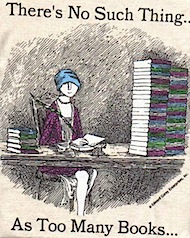Menu
 The title of this post is drawn from the tenth novel, and the first of the fourth movement of Anthony Powell masterpiece A Dance to the Music of Time. Its the one with Erridge’s funeral and Pamela Widerpool’s disposal of Trapnel’s manuscript in the canal. It’s use by Powell references a quote from Lindsay Bagshaw and was a satire on various journalists of the time.
The title of this post is drawn from the tenth novel, and the first of the fourth movement of Anthony Powell masterpiece A Dance to the Music of Time. Its the one with Erridge’s funeral and Pamela Widerpool’s disposal of Trapnel’s manuscript in the canal. It’s use by Powell references a quote from Lindsay Bagshaw and was a satire on various journalists of the time.
I was reminded of it when this wonderful collection of bookshelf porn popped up on a idle stroll through Facebook. Hat tip to Paulette Paterson via Alex Tewes for that. My children have oft mocked my inability to pass my a bookshop without emerging with a purchase, a sin or virtue that I shared with my mother while she was alive. I have only ever thrown away one book in my life, although several have been “borrowed” and may not return to the fold. Such losses have not stemmed the flow and just over a year ago I resorted to building book corridors to accommodate the volume.
Now I still have to complete the re-organisation of books that this move has enabled, and a year has passed. Sometime soon I will move everything bar the science fiction (which is organised) out and then reinstall it my subject area. However I also realised during the year that the limits would soon be reached again so reluctantly I decided to experiment with a Kindle. I started with the Kindle App on the iPad and that was useful, but not so easy to read in bed at nights. The Kindle is a specialist devise and coupled with a wallet with an integral light works in multiple locations, fits into the pocket of my coat and is generally useful.
I am by bent, a user of specialist tools. I contrasted this with Euan’s approach to using the iPhone for everything in a previous post. So I have a sat nav, and an iPhone, and an iPad, and two cameras (portable, serious) and now a Kindle. The net carrying capacity is less despite such multiple devices and it allows more flexibility and, critically better management of battery life!
That said a Kindle changes habits, and there are some things it does not do well. So I have over the last few months evolved a policy for book purchases and have the following taxonomy:
So that is the current strategy, rather like Cynefin its about bounded applicability. However, if I had a larger house with more capacity for books, well I just might revert. Books call to you from bookshelves, you merely access then electronically.
Cognitive Edge Ltd. & Cognitive Edge Pte. trading as The Cynefin Company and The Cynefin Centre.
© COPYRIGHT 2024

I frequently reference messy coherence as a key aspect of living with complexity and I've ...
In between my own backlog of work and dispatching son back to the University of ...